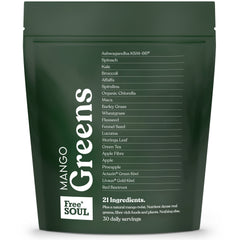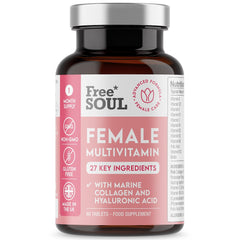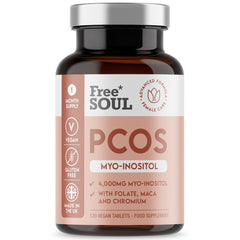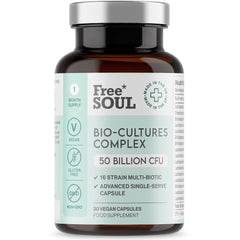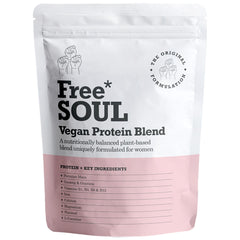What’s The Hype Around Magnesium? According to a Nutritionist

Magnesium has seen its fair share of the spotlight in the world of nutrition, and for a good reason. As an essential mineral responsible for over 300 biochemical reactions in the body, its influence on our overall health is undeniable. Let's delve into the science behind this vital nutrient to understand its significance and how we can best ensure adequate intake.
What is Magnesium?
Magnesium is a mineral found abundantly both on Earth and inside our bodies. It's integral to many of our body's essential functions, from energy production to brain activity.
The Role of Magnesium in the Body
- Energy Production: At a cellular level, magnesium is a cofactor in ATP synthesis, the body's energy currency.
- Nerve Function: Magnesium helps regulate neurotransmitters that send messages throughout the brain and body.
- Muscle Movement: It aids in the contraction and relaxation of muscles, preventing issues like cramps.
- Bone Health: About 60% of the magnesium in our bodies is found in bones, supporting their structure and strength.
- Protein Formation: Magnesium plays a role in creating new proteins from amino acids.
Different Types of Magnesium
Magnesium supplements come in various forms, each with specific benefits and applications:- Magnesium Citrate: Primarily known for its laxative properties, this form is often recommended for constipation relief.
- Magnesium Bisglycinate: This is a chelated form of magnesium that offers higher bioavailability, meaning it’s more easily absorbed by the body. Known for its calming properties, it's especially beneficial for those aiming to improve sleep or manage anxiety. This is the type of magnesium found in the Vegan Protein Blend.
- Magnesium Oxide: While it contains a high amount of elemental magnesium, its bioavailability is relatively low compared to other forms. It is more likely to promote digestive upset.
There are other forms of magnesium, but these are among the most common.
How Much Magnesium Do We Need?
According to UK guidelines, the recommended daily intake for magnesium varies across different age groups and life stages. For adult women aged 19-64, it's suggested to consume 270 mg per day. Pregnant women might require a slightly increased amount to support the developing foetus, but it's always crucial to consult with a healthcare provider in such cases. Ensuring a balanced diet rich in magnesium-containing foods or, if necessary, considering supplementation after consulting with a nutritionist or healthcare provider can help meet these guidelines.
Symptoms of Magnesium Deficiency
A deficiency in magnesium might manifest as:- Fatigue or muscle weakness
- Muscle cramps or twitches
- Irregular heart rhythms
- Nausea and vomiting
- Loss of appetite
- Numbness or tingling
Magnesium and Stress Management
Stress can deplete magnesium levels in the body, creating a vicious cycle where low magnesium levels lead to heightened stress responses, which in turn lower magnesium even more. Ensuring adequate magnesium intake can be particularly crucial for individuals living in consistently high-stress environments.Foods High in Magnesium and How to Incorporate Them
A diet diverse in whole foods is one of the best ways to ensure adequate magnesium intake. Here are some magnesium-rich foods and suggestions on how to include them in your daily meals:- Leafy Greens (e.g., spinach, swiss chard): Toss them in salads, blend them in smoothies, or sauté with garlic for a nutritious side dish.
- Nuts and Seeds (especially almonds, cashews, and chia seeds): Snack on a handful of mixed nuts, sprinkle seeds on top of salads or yoghurts, or incorporate them into your homemade bread or granola bars.
- Whole Grains (like quinoa, brown rice, and whole wheat bread): Swap out white rice for brown or wild varieties, opt for whole grain bread, or try a quinoa salad with your favourite veggies.
- Dark Chocolate: Choose varieties with higher cocoa content (70% and above) for a treat that's not only delicious but also magnesium-rich.
- Avocados: Slice them for salads, mash for a creamy toast spread, or blend into smoothies for added richness.
- Bananas: Perfect for a quick snack, in fruit salads, or sliced on top of oatmeal.
- Legumes (like beans, lentils, chickpeas): Use them as a base for hearty soups and stews, in salads, or mash them to make dips like hummus.
- Fatty Fish (like salmon and mackerel): Besides being rich in omega-3 fatty acids, these fish are a good source of magnesium. Grill, bake, or pan-sear for a delicious meal.
Tips to Enhance Magnesium Absorption:
- Cooking: Cooking can break down some of the anti-nutrients that might inhibit magnesium absorption. So, consider lightly steaming or sautéing magnesium-rich veggies.
- Soaking and Sprouting: For grains, nuts, and seeds, soaking and sprouting can enhance the bioavailability of magnesium by reducing phytic acid, a natural compound that can interfere with mineral absorption.
- Balanced Diet: The absorption of magnesium can be affected by the balance of other minerals in your diet, particularly calcium. Aim for a balanced intake of both.
Conclusion
Magnesium's role in optimal health is expansive and profound. From the cellular level to the entirety of our bodily systems, its influence is undeniably vast. Being informed about its importance and ensuring adequate intake, whether through diet or, when necessary, supplements, is pivotal for maintaining health and wellness.
By Marilia Chamon, Registered Nutritional Therapist, Gut Health & IBS Expert
Founder of Gutfulness Nutrition Instagram @gutfulnessnutrition
**At Free Soul, your well-being is our priority, and although we pride ourselves on our expertise in women's health and wellbeing, it is important to acknowledge the individuality of each person. Features published by Free Soul are not intended to treat, diagnose, cure or prevent any disease, or replace the advice of your GP. We always recommend consulting with a healthcare provider if you encounter any health concerns, and we’ll always be here to support you so you’re never alone on your journey.




